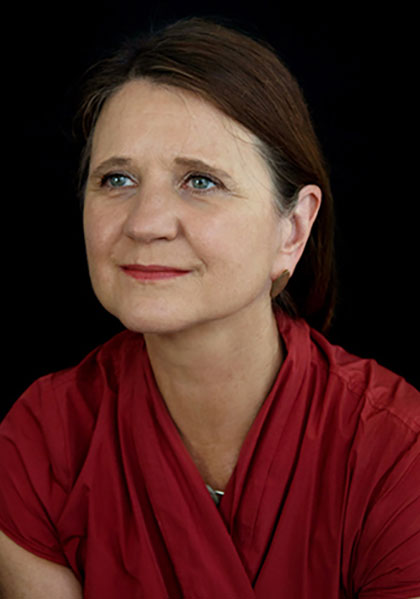In Pursuit of Happiness

Life is like a long mountain trek – at least that’s how developmental psychologists see it. We hike from one destination to another, pursuing our goals – sometimes heading up toward the summit, other times going straight along a ridge. “We’re real goal junkies,” says Alexandra Freund. Even Buddhism, which is all about freeing oneself from desires and attachments, has goals, says Freund (who once sat on a panel with the Dalai Lama) – namely, of freeing oneself of goals and desires.
Personal goals give our life direction, fill us with a sense of purpose, motivate us to do some things and let others drop. If we believe Albert Einstein, chasing goals makes us happy. A quote attributed to the legendary Nobel Prize-winning physicist goes: “If you want to live a happy life, tie it to a goal, not to people or things.” Alexandra Freund’s research confirms that setting, pursuing and attaining goals is an important factor for our well-being and mental health. But it is not the only one. It is just as important to recognize when goals become unrealistic and to be able to let go of them. “If I realize after one semester that engineering is not for me, there’s no point hanging on in there,” says Freund. “We should give ourselves the freedom to let things go.” Letting go also contributes to happiness.
Something missing
The psychology professor researches psychological development in adulthood and is on the executive committee of the University Research Priority Program Dynamics of Healthy Aging. The question of how and why people set goals during the course of their life and how these change over time plays a central role in her research. “The trigger for setting a goal is usually a feeling that something is lacking or missing, and a wish to purposefully counteract this,” says the psychologist. This deficit experience is a major driver for our actions, development and personal happiness. But once we achieve a goal, it generally loses its shine immediately, and we look for a new one. “We’re stuck on a hedonistic treadmill,” says Freund.
Personal goals differ greatly from one individual to the other. They range from the small things that we plan to do during the course of a day (such as finishing a piece of work, cooking a decent meal, doing some exercise) to the major life themes that are important to us (like staying healthy, having a good relationship, getting rich, contributing to society). But our idea of what is worth striving for is fluid, changing as we grow older. A 20-year-old’s goals are very different from a 70-year-old’s.
“Big life goals are mainly the stuff of youth,” says the developmental psychologist. Young people are preoccupied with the important question of what to do with their lives and what they want to achieve. Freund’s studies have found that the goals young people set themselves are mostly to do with gaining something – be it graduating from high school, entering the world of work, forging a career or starting a family. “Everything is oriented toward growth,” says Freund. The mountain peaks beckon, as it were.
In middle age, between the ages of about 40 and 60, our perspectives change – we move away from the youthful desire for gain toward actively maintaining what we have already achieved. Our goals then become more about reinvigorating our relationship, for example, or developing within our current job. “It’s not the same as stagnation,” says Alexandra Freund. “Stability is an important element of life satisfaction at this age – in sharp contrast to younger people, who do not strive for stability.”

We should try to look on the bright side. As our sphere of activity gets smaller, we may discover and appreciate anew the beauty of our immediate surroundings.
Stop putting things off
Psychologist Freund has also found that people in mid-life tend to postpone goals that are important to them. She calls this phenomenon the bucket list effect. At this stage of life, we are often juggling work and family responsibilities, which leaves little time for ourselves, so our hobbies and other goals are put on the back burner – waiting for supposedly quieter times when we no longer have to work and the kids have left home.
That’s not really a great strategy, says Freund. It would be better to seek compromises and to adapt our needs so that they can be integrated into our daily lives. “If climbing is out of the question with young children, perhaps you could organize occasional family hiking trips instead,” says the researcher. Finding a way to do the things that are important to us now instead of postponing them until later positively affects our personal happiness. And who knows, maybe the things we wanted to do aged 45 will no longer interest us at 65.
After all, at the end of our working lives, our goals change again. Retirement marks a significant new phase in our biographies – and heralds a revival of the big questions: What do I want to do with the rest of my life? What do I still want to achieve? Is it finally time to indulge in my favorite hobby? Tour the world in a campervan? Start a knitting circle? Get more involved in the church? It’s best to prepare in advance for retirement, says Freund, rather than just adopting a wait-and-see attitude.
A lot of retirees feel drawn to volunteer work. Freund has found in various studies that older people are on average significantly more prosocial and altruistic than younger people. They may look after grandchildren, work in soup kitchens, give classes in their specialist subjects, tutor disadvantaged schoolchildren or help migrants learn German. One reason for this social involvement is probably that older people are anxious not to be perceived as a burden on society and thus want to make a positive contribution, surmises Freund.
Avoiding losses
With increasing age, we not only adopt altruistic goals – we also, in view of the biological aging process and increased risk of illness, aim to avoid or compensate for losses. “In this stage of life, the ability to redefine experiences of loss and turn them into new goals is important,” says Freund. She cites the example of an older physicist who realized with frustration when working on a project that he could no longer keep up with his younger colleagues in terms of calculation speed. But compared to them he had much broader knowledge and more experience. So he decided to concentrate on identifying the bigger-picture connections, and left the mathematical detail work to the younger team members.
“That was pretty smart of him,” says Freund. “He avoided a loss – his decreasing calculation speed – by compensating for it with a positive reassessment of his skills.” For young people, a strategy of avoiding losses would be viewed very negatively, found the researcher, but for older people it is perceived positively. We should always try to look on the bright side, says Freund: as our sphere of activity gets smaller, we may discover and appreciate anew the beauty of our immediate surroundings.
Set appropriate goals
Freund’s research illustrates the importance of setting goals that really appeal to us, whatever our age. At the same time, she notes, the idea is not to achieve our goals at all costs: “Enjoying the moment as we work toward our goal is also valuable.” For example, if we set ourselves the goal of running five times a week to keep fit, the specific plan of action is just as important as the goal. Will I run alone or with others? Is the route varied and interesting, or boring and difficult? Do I really need to go five times a week, or would three times be better for me?
These qualitative aspects are crucial determinants of whether pursuing a goal will make us happy and satisfied. “If the path isn’t right, then neither is the goal,” says Freund. A point worth keeping in mind as we pursue our next goals: let’s enjoy the journey, whether our path is steep and direct to the summit, straight along a ridge, or a gentle stroll down the hill.